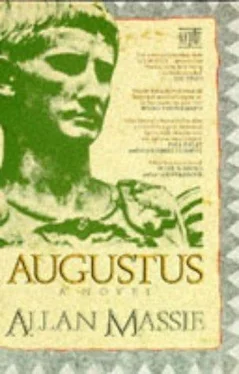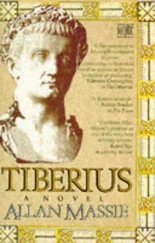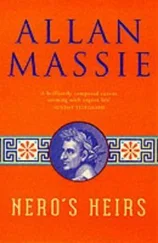Allan Massie - Augustus
Здесь есть возможность читать онлайн «Allan Massie - Augustus» весь текст электронной книги совершенно бесплатно (целиком полную версию без сокращений). В некоторых случаях можно слушать аудио, скачать через торрент в формате fb2 и присутствует краткое содержание. Жанр: Исторические приключения, на английском языке. Описание произведения, (предисловие) а так же отзывы посетителей доступны на портале библиотеки ЛибКат.
- Название:Augustus
- Автор:
- Жанр:
- Год:неизвестен
- ISBN:нет данных
- Рейтинг книги:4 / 5. Голосов: 1
-
Избранное:Добавить в избранное
- Отзывы:
-
Ваша оценка:
- 80
- 1
- 2
- 3
- 4
- 5
Augustus: краткое содержание, описание и аннотация
Предлагаем к чтению аннотацию, описание, краткое содержание или предисловие (зависит от того, что написал сам автор книги «Augustus»). Если вы не нашли необходимую информацию о книге — напишите в комментариях, мы постараемся отыскать её.
Augustus — читать онлайн бесплатно полную книгу (весь текст) целиком
Ниже представлен текст книги, разбитый по страницам. Система сохранения места последней прочитанной страницы, позволяет с удобством читать онлайн бесплатно книгу «Augustus», без необходимости каждый раз заново искать на чём Вы остановились. Поставьте закладку, и сможете в любой момент перейти на страницу, на которой закончили чтение.
Интервал:
Закладка:
And this was true. I have talked to you about this, Gaius and Lucius, but I have never put it in writing for you. The value of planning diminishes in accordance with the complexity of the state of affairs. Believe me: this is true. It may seem paradoxical. You may think that the more complicated a situation is, the more necessary a plan to deal with it. I shall grant you the theory. But practice is different. No plan can be equal to the complexities and casualties of political life. Hence, adherence to a plan deprives you of the flexibility which you need if you are to ride the course of events; for a moment's reflection should enable you to see that it is impossible (even with the help of the wisest soothsayers and mathematicians) to predict what will happen; and it is folly to pretend that you can control the actions of other men with any certainty. Therefore a plan is only suitable for the simple operations of life; you can plan a journey to your country house, but you cannot plan a battle or a political campaign in any detail. You must have a goal, my sons, but to achieve it, nothing is more important than that you retain fluidity of thought. Improvisation is the secret of success in politics, for most political action is in fact and of necessity reaction.
So I said now to Agrippa, 'I have no plan but I have purposes. I intend to avenge Caesar and to restore the Republic. And first I intend to safeguard our position. All my manoeuvring is directed towards these aims. You ask about Antony? You call for a reunion of the Caesareans. Well, so do I. But does Antony? As far as he is concerned, Caesar is dead and Antony is his successor. He must be persuaded that it is not so, and that he, Antony, is less than half our party.'
Meanwhile, as Maecenas was quick to tell me, Antony was doing all he could to destroy my reputation. He spread many rumours about me. I shall set them down, because I am not ashamed to have been slandered.
He let it be known that I had played the role of catamite to Caesar to encourage him to adopt me. He added that, subsequently, I had submitted to the lusts of Aulus Hirtius, Procurator of Spain, in return for 3000 gold pieces: The boy lends out his body at interest,' he said, 'it's his banker's blood, no doubt.' He accused me of effeminacy and sent agents among my troops to ask why they let themselves be commanded by a boy-whore.
The accusations were false of course; it was ridiculous to suppose that Caesar would so reward a boy who behaved in such a disgusting way. As for Aulus Hirtius, he was so repulsive that one of his slave-boys hanged himself rather than endure his embraces. (The boy was a Gaul too, and everyone knows that Gallic boys think it no shame to sleep with mature men; the Druid religion encourages youths to prostitute themselves to the priests, and Gallic warriors are accustomed to choose the boys who look after their war-horses for their good looks.) Besides, it was absurd to suppose that 3000 gold pieces would attract a young man of my fortune.
Curiously these allegations did me no harm with the troops. They didn't believe them. Even if they had, Antony should have known that soldiers take pleasure in the vices of their commanders. Caesar's legionaries had delighted in the story of their general's seduction by King Nicomedes. They had even sung a dirty song about it, which I shall not repeat to you.
Agrippa of course was furious. He told me I was bound to have such stories made up about me as long as I associated with a pansy like Maecenas. He said that even if my men chose not to believe them, the senators whose support I was seeking would hardly like it to be thought that they were associating with a tart.
'Don't be so silly,' I said, 'there's nothing to worry about. Everyone knows Antony is a liar.'
All the same I was displeased myself, though my displeasure was mixed with the satisfaction that the circulation of such absurd and malicious rumours showed that Antony was taking my rivalry seriously. Nevertheless, I thought it as well to do what I could to disprove the lies. I stopped shaving my legs for one thing, and grew a beard too; and I took care to let pretty slave-girls be seen round my quarters. Maecenas introduced me to one Toranius, a dealer who was able to supply me with the most delectable fruits of the market.
I tell you these things, my sons, not for any pleasure I feel in the memory – to speak the truth I look back on them with a mixture of amusement and distaste – but for two reasons: first, that you may learn from my own lips what manner of man I have been, and so be able to discount the malicious and disreputable rumours with which I am sure you will be fed; and, second, because you may learn in this way how much prudence, self-control and decision are necessary to manipulate public opinion. I was careful to arrange that Maco should see a Circassian girl slip shiftless from my tent as he awaited an interview. I knew he would go back and say, 'He's a right boy, our general, you should have seen the bit of fluff he had last night…'
Antony was fighting only for himself; but I had a vision of Rome. No one knows how ideas are formed, what influences operate on the mind, to what extent a man creates a world-view for himself. These are deep matters which I have discussed with philosophers, and, as the poet says, 'evermore came out, by that same door wherein I went'; and with Virgil, who was something more profound than a philosopher, a true poet. Here let me say a word on the subject of poets. Most of them are no more than versifiers. Any gentleman should of course be able to turn a verse; you, Lucius, have written elegiacs that please me. Beyond that, when it becomes a profession, there is too often something despicable in the craft. It encourages conceit and extravagant behaviour, monkey-tricks. True poetry has a moral value, most verse none; some is frankly immoral. Occasionally however you find a poet who offers more even than that. He is a man possessed of insight, a man through whom the Gods have chosen to speak. (By the way, I am glad that I have never heard you mock the Gods; only those with no rudder, men who trust complacently to their own natural buoyancy, do that. I fear the man who does not fear the Gods, for he lacks proportion.) I am fortunate to have known one such poet, Virgil. The spirit of Rome inhabited him; he saw what was hidden from other men. There is no man I have more deeply revered. I am sometimes tempted to believe that the core of my political thought derives from Virgil. And yet this is false. I was moving in that direction before I ever talked with him. Is it possible that ideas can exist, as it were, in the air?
Caesar was naturally an inspiration. Yet, speaking under my breath to you, my sons, let me confess I never cared for Julius. There was something meretricious in him, something rotten. He revealed the full decadence of the Republic; when he led his legions across the Rubicon in that winter dawn, it was as if he tore a veil away from a shrine and discovered to all that the God had abandoned it. He was a great general; his conquest of Gaul and defeat of Pompey were imperishable feats. But what did he do then? He was tempted by monarchy – I have it on good authority that when Antony three times presented him with a kingly crown on the occasion of the Feast of the Lupercal, both Caesar and Antony expected that the crowd would hail him as king, and thus allow him to accept the crown. Inept politicians! Not to have arranged that the wind would blow that way! There was a vanity to him; he wore the high red boots of the old kings of Alba Longa; can you imagine me behaving so absurdly? But there was room for such vanity – it filled a vacancy at the heart of his imagination. Having achieved supreme power, he did not see that he was only at the beginning of his labours.
Читать дальшеИнтервал:
Закладка:
Похожие книги на «Augustus»
Представляем Вашему вниманию похожие книги на «Augustus» списком для выбора. Мы отобрали схожую по названию и смыслу литературу в надежде предоставить читателям больше вариантов отыскать новые, интересные, ещё непрочитанные произведения.
Обсуждение, отзывы о книге «Augustus» и просто собственные мнения читателей. Оставьте ваши комментарии, напишите, что Вы думаете о произведении, его смысле или главных героях. Укажите что конкретно понравилось, а что нет, и почему Вы так считаете.












